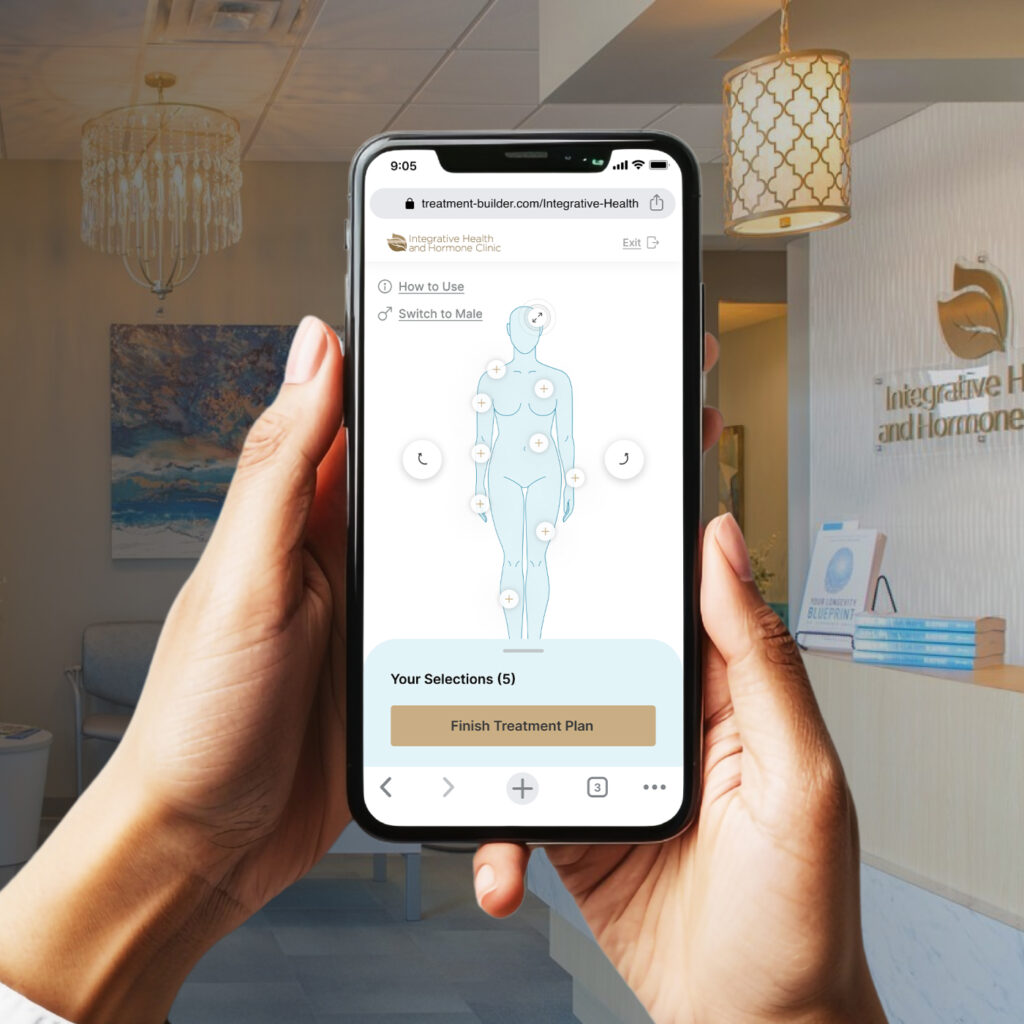
We don’t Guess, We Test!
Functional medicine employs advanced testing to uncover the intricate relationships between different bodily systems and identify the root causes of health issues.
Functional medicine testing offers a more comprehensive approach to health assessment by examining detailed biomarkers and systems that conventional medical tests might overlook.
While conventional medicine often focuses on diagnosing specific diseases through standard lab work, functional medicine practitioners use sophisticated testing methods to understand how multiple systems interact and influence overall health.
For instance, they might use organic acid testing to evaluate cellular energy production, neurotransmitter metabolism, and detoxification pathways – processes that are typically not assessed in routine medical visits.
Advanced hormone testing goes beyond basic blood measurements to examine hormone metabolites and their ratios throughout the day, providing crucial information about how hormones are being processed and utilized by the body.
Comprehensive stool analysis can reveal detailed information about gut health, including beneficial and harmful bacteria levels, digestive enzyme production, inflammation markers, and the presence of parasites or yeast overgrowth.
Heavy metal and environmental toxin testing helps identify exposure to harmful substances that might be contributing to chronic health conditions.
Additionally, genetic testing can highlight variations in genes that affect how individuals process nutrients, detoxify chemicals, and respond to different medications. This multi-layered approach to testing allows practitioners to develop highly personalized treatment protocols that address not just individual symptoms but the complex web of factors contributing to a person’s health status, rather than simply managing symptoms.
While traditional doctors typically order standard blood panels that measure basic health markers like cholesterol, blood sugar, and complete blood counts, functional medicine practitioners utilize specialized tests that analyze nutrient levels, hormone balance, gut microbiome composition, food sensitivities, toxic burden, and genetic variations.
In some cases, health insurance is accepted by the laboratory for at least partial reimbursement. Patients may also choose to use their flexible spending account for medical expenses like labs. Some laboratories we work with do not accept insurance. We also offer bloodwork to be drawn in office at substantially reduced costs compared to other local labs. However, this is not then billed to insurance.
Comprehensive Serum Sex Hormone Evaluation
When testing hormones, we look beyond just the standard measurements of individual hormones to examine the entire endocrine system and how hormones are being metabolized and utilized.
For example, instead of only measuring total estrogen levels, we analyze different forms of estrogen. We also examine the relationship between estrogen and progesterone, as the ratio between these hormones is often more important than their absolute levels.
Examples of Hormone Diagnostics (Blood)
- Estrone
- Estradiol
- Progesterone
- Testosterone
- DHT
- FSH
- LH
- Prolactin
We do attempt to obtain these labs luteal phase of the cycle for cycling women.
Urine Hormone Testing
Urine testing is the only way to comprehensively evaluate estrogen metabolism to provide insight into estrogen cancer risk. Testing via urine is crucial because some estrogen metabolites can be protective while others may increase health risks. Urine testing provides a different type of evaluation as compared to saliva or blood, and is often the best fit when poor estrogen metabolism or clearance is suspicioned due to fibroids, cysts, and even cancer. This is an excellent test for individuals with heavy painful cycles and PMS.
We do attempt to obtain these labs luteal phase of the cycle for cycling women.
Additionally, we may test hormone levels multiple times throughout the day or month to understand natural rhythms and cycles, rather than relying on single-point measurements that might miss important patterns or fluctuations.
Comprehensive Thyroid and Thyroid Antibody Testing
In order to *not* miss thyroid conditions, additional labs beyond a TSH should be checked. Free T4 and Free T3 are the body’s main thyroid hormones. Many patients have poor T4-to-T3 conversion. Free T3 is three times as potent as T4. Your body only has T3 receptors. That means you could have very high T4 levels, but if they aren’t converting to T3 and binding to receptors, their signal or message isn’t getting sent. That high T4 level is essentially useless. Some individuals instead convert T4 to Reverse T3, (opposite of T3). This can happen in times of stress, surgery, trauma, and chronic illness. Additionally thyroid peroxidase antibodies (TPO) and Thyroglobulin Antibodies (TG) are often also high in autoimmune diseases like Hashimoto’s or Graves’ disease. These antibodies can also fluctuate. Basic thyroid labs can be normal, while autoimmune thyroid conditions can be missed if these labs are not checked.
Examples of hormones checked:
- TSH, Free T4, Free T3, Reverse T3, thyroglobulin antibodies, thyroid peroxidase antibodies.
Insulin Resistance Testing
Beyond assessing fasting glucose and HgAlc levels, our clinic often checks fasting insulin levels as well. We may choose to order glucose or insulin tolerance testing as well as utilize continuous glucose monitoring when we feel it would benefit out patients.
AdrenoCortex Stress Profile
The Adrenocortex Stress Profile is an easy in home salivary hormone test that evaluates the key stress hormones, cortisol and DHEA.
Four samples collected throughout the day allow for circadian rhythm assessment. Salivary adrenal hormone testing may uncover biochemical imbalances, which can adversely affect:
- Mood
- Sleep
- Immune Defense
- Thyroid Function
- Weight Control
- Resistance to Stress
- Energy
- Cardiovascular Health
Urine Neurotransmitter Testing
Neurotransmitters are brain chemicals that help facilitate transmission of signals from one neuron to the next across a synapse. Neurotransmitters work with receptors in the brain to influence and regulate a wide range of processes such as mental performance, emotions, pain response and energy levels. Imbalances in certain neurotransmitters have been found to be associated with:
- Mood disorders like depression and anxiety
- Adrenal dysfunction, fatigue, and insomnia
- Loss of mental focus: ADD, ADHD, brain fog
- Addiction and dependency
- Loss of appetite control and insulin resistance
This testing can help to target necessary nutrients and medications to help patient’s improve their psychological health.
Genetic Testing for Mental Health
Genomind is a company that provides pharmacogenetic testing services, which can help healthcare providers make more informed decisions about medication selection and dosage for their patients.
Genomind tests for genetic variations that can affect a person’s response to medications used to treat mental health conditions, such as: Depression, Anxiety, ADHD, Bipolar disorder, and Schizophrenia.
This is very useful for patients who have had medication resistant diagnoses or who haven’t been able to find appropriate medications.
Food Allergy and Sensitivity Testing
Many patients present to our office having already seen an allergist who checked them for food allergies (IgE testing). Allergies cause strong symptoms such as anaphylaxis. Sensitivities, on the other hand can cause a wide array of less severe symptoms and thus can be difficult to identify unless tested for. We offer IgG, IgA, and IgE testing.
Comprehensive Stool Testing
A 3 day stool analysis is an excellent way to gain insight into digestion and absorption of protein and fats. This test helps determine need for digestive enzymes, HCL, and even bile. It shows the gastrointestinal microbiome and need for more fiber and probiotics. It also reveals inflammation and infections like bacteria, parasites, and yeast.
Advanced Cardiovascular Assessment
We explore further beyond a basic lipid (cholesterol) panel, to better investigate cardiovascular risk. This type of testing is often called a lipoprotein particle analysis with subfraction measurements of cholesterol including lipoproteins or transporters of cholesterol and triglycerides through the bloodstream. The number and size of these lipoproteins may better predict their atherogenic potential—or, their potential to promote the formation of fatty plaques in the arteries.
Comprehensive Nutritional Analysis
Most patients we see have nutritional deficiencies. Medications we take, food sensitivities leading to poor digestion and absorption, our lifestyle (coffee and alcohol consumption, poor eating), and even stress all contribute to these deficiencies. We offer a comprehensive nutritional test investigating which nutrients: vitamins, minerals, amino acids, antioxidants, and fatty acids you may be deficient in in order to truly personalize your supplement needs and help you save money taking the guessing work out
Urine Iodine Testing
There are currently two ways to test for low iodine. The skin patch test isn’t the best available testing option, because your body could be dehydrated the day you test. Also, even if your skin does or doesn’t need iodine that day, that’s not necessarily reflective of how much your other organs, such as ovaries, may need. A better test is the iodine loading test, where the individual takes a high-dose iodine pill of 50 mg and then collects his or her urine over twenty four hours. The more iodine excreted, the less deficient the body is. The less excreted (meaning the more the body soaks up) the more deficient the body is. If your body is already saturated with iodine, you urinate more of it. If found to be low, supplementing can help!
Genetic Testing
The 23 and Me and Ancestry.com genetic analyses looks for single nucleotide polymorphisms (snps, aka: genetic variants). Many patients do not know what to do with their data. However, patients can share this data with our clinic and we will analyze and help them to interpret clinically relevant snps to make beneficial use of what can appear to initially be overwhelming.
Biotoxin Illnesses
We also explore for biotoxin (Lyme and mold) related illnesses often called (Chronic Inflammatory Response Syndrome, CIRS). Some of the tests we use here include:
- Vasoactive Intestinal Peptide (VIP)
- Melanocyte Stimulating Hormone (MSH)
- Transforming Growth Factor Beta-1 (TGF Beta-1)
- C3a & C4a
- Vascular Endothelial Growth Factor (VEGF)
- Matrix Metallopeptidase-9 (MMP-9)
Urine Mycotoxin Testing
Mycotoxins are toxic metabolites produced by fungal organisms, commonly known as molds. Mycotoxins are well documented in high quality peer-reviewed scientific journals to have a wide array of toxic effects in humans. We use a lab with a semi-quantitative competitive ELISA platform to determine the presence of 16 clinically significant mycotoxins in the body.
Heavy Metal and Nonmetal Chemical Testing
We are exposed to toxic chemicals in the air we breathe, water we drink, foods we consume, medications we take, cleaning and personal care products we use, and even through our homes and places of work.
There are a number of elements that are toxic to the human body, interfering with its functioning and undermining our health. These include metals such as: mercury, lead, cadmium, aluminum, and arsenic. These toxic metals have no known physiological functions. They can be toxic to organ systems and may disrupt the balance of essential nutrients. At our clinic toxic metals and essential element status can be assessed in urine, blood, feces and hair.
We also can test for nonmetal chemicals including organophosphates like glyphosate (Round up) which we commonly find elevated in our farming patients but also in patients who don’t eat organic. We can look for elevations in: phthalates, vinyl chloride, benzene, pyrethrins, xylenes, styrene, MTBE and ETBE, perchlorates, acrylamide, and diphenyl phosphates. These are tested in the urine.


